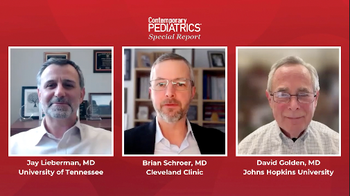
Viewpoint: On being a pediatrician
A physician in his mid-40s, Dr. Rifkin presumably may be roughly midway through his career as primary care pediatrician. And this has led to some personal reflections about being a pediatrician.
After finishing 18-year-old Brandon's physical exam, his mother said to me, "You've been Brandon's pediatrician since the day he was born."
When we think positively about our jobs, what resonates most is our unique individual patient encounters: The closeness I feel to Jenna, a cancer survivor, and her family. That gift and note of genuine appreciation from Mrs Randolph thanking me for taking care of her children, when it never dawned on me that I had done anything special or made that kind of difference to her. That quiet but satisfying professional feeling I had when I correctly diagnosed Cara with diabetes, even though she was only 15 months old, potentially preventing a life-threatening presentation with ketoacidotic shock.
As pediatricians, we all have stories like these. However, it is usually only looking back that we realize how many of these moments we've had. Our professional day-to-day lives often seem tiring, not like a Hollywood movie. There are days we deal more with business headaches and personnel headaches than with patients with headaches. But there is a reason doctors are so often the subject of Hollywood. There is significance in what we do.
Brandon's mom's comment about my caring for Brandon all these years caused me to think about it from an even larger perspective-I started reflecting about pediatrics as a career and how it relates to a meaningful life.
One aspect that we so easily take for granted is this extraordinary moment in history in which we get to practice medicine. For millennia, medicine was based on false beliefs, trial-and-error, guesswork, and all kinds of complicated treatments that did not work and often caused terrible harm. Medical treatments involved bleeding, purging, cupping, leeching, bizarre diets, and infusions of metals and plants. As science writer Lewis Thomas said, these therapies were "based on the weirdest imagining about the cause of disease, concocted out of nothing but thin air-this was the heritage of medicine up until a little over a century ago."
All of that changed with the acceptance and progress of science as opposed to superstition. Now we get to participate in this historically relevant era of rapid medical advancement. We can ease pain, make people's lives better, and routinely save lives through such things as antibiotics and immunizations. Since the mid-1800s, life expectancy in much of the world has doubled, a good deal of which is the result of pediatric care and prevention. It's as though modern medicine and public health have given each of us now living a second lifetime. What a great time to be a doctor.
But there is a flip side, one that should humble us. There's still an awful lot in medicine we just don't know. Already in my short career, there have been many substantial changes in pediatric standards. We've also seen multiple medications and immunizations pulled from the market through the years for safety reasons.
It always serves us well to be open-minded and seek evidence, rather than doing something just because "that's the way it's done." It is surprising how much we do now that is based on tradition, rather than on good scientific evidence. In this era of medical amazements, humbleness and a hunger to learn still serve us well. To make just one prediction, I suspect that how we evaluate, categorize, and tailor medication for behavioral health issues-from autism to ADD-will, in the future, make what we do now seem as unsophisticated and elementary as the first days of microbiology seem to us now.
At some point, I'll hang up my stethoscope for the last time. Perhaps I'll know the time has come when I'm doing a college physical on Brandon's child.
It'll be interesting to see how my thoughts change between now and then. But I'm pretty sure, when I walk out of my office for that last time, that I'll be glad to have been a pediatrician. I'll have made a genuine contribution to the children I've cared for and had some fun along the way. And kids are just so worthwhile. By caring for children and their families, I'll feel I made a limited but definite positive net impact on the world. And that's what makes what we do meaningful. Being a pediatrician is something to be proud of, and a good way to spend a life.
I thanked Brandon and his mother. I signed his college form, said goodbye, and went on to my next patient.
Newsletter
Access practical, evidence-based guidance to support better care for our youngest patients. Join our email list for the latest clinical updates.



